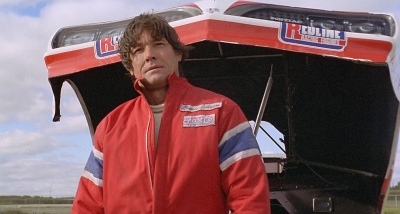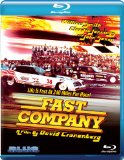| Reviews & Columns |
|
Reviews DVD TV on DVD Blu-ray 4K UHD International DVDs In Theaters Reviews by Studio Video Games Features Collector Series DVDs Easter Egg Database Interviews DVD Talk Radio Feature Articles Columns Anime Talk DVD Savant Horror DVDs The M.O.D. Squad Art House HD Talk Silent DVD
|
DVD Talk Forum |
|
|
| Resources |
|
DVD Price Search Customer Service #'s RCE Info Links |
|
Columns
|
|
|
Fast Company
Blue Underground // R // May 19, 2009
List Price: $34.95 [Buy now and save at Amazon]
It's
kind of hard to believe that a filmmaker with the profile and fiercely loyal fanbase of David Cronenberg could have a "lost" movie. Still, bankruptcy and the legal wrangling that followed kept Fast Company -- shot in the late '70s between Rabid and The Brood -- largely unseen for decades until being rescued by Blue Underground just a few short years ago. Then again, aside from the name on the marquee, there's not much about Fast Company that stands out as distinctively Cronenberg. The recurring themes in his work -- sexual awakening, the inexorable link between sex and violence, and some sort of grotesque physical transformation, to rattle off a few -- are nowhere to be found in this straightahead drive-in flick. Fast Company is a B action movie about the sticky underbelly of the racing world: fast cars, loose women, a moustache-twirlingly evil corporate type, and even a couple of explosions just for the hell of it.
Lonnie "Lucky Man" Johnson (William Smith) is one of the biggest stars on the racing circuit even if he never really scores a win. After all, championships cost money, and winning's not in the budget. Johnson's just another marketing tool, and FastCo is only in it to shill cans of motor oil. Still, FastCo's made a lot of money off Johnson and his team, and leaning back in his posh trailer, he doesn't have all that much to gripe about either. Even if FastCo only wants him to do well enough to be competitive, Johnson's still in it to win it, but a miscalculation souping up his ride makes for a pretty nasty explosion on the track. It'll take weeks to get a new car lined up -- and that's if FastCo is willing to pick up the tab in the first place. Still, FastCo wants their meal ticket to keep making the rounds and plug those red, white, and blue cans, so marketing muckity-muck Phil Adamson (John Saxon) tells Johnson that he'll be tooling around in the team's funny car.
After all, the folks in the stands are there to see the Lucky Man, not the up-and-comer who's usually in the funny car's driver's seat (Nicholas Campbell). Johnson feels guilty as hell about having to shove The Kid to the sidelines, so he stops towing the company line. FastCo gives Johnson the axe and swaps his team out with a new one: this time headed up by archrival Gary "The Blacksmith" Black (Cedric Smith). 'Course, this being a Western with a racing backdrop, Johnson and company rally back, leading up to an explosive showdown...
Cronenberg wasn't trying to hammer out any sort of profound artistic statement with Fast Company. It careens head-on into a pretty familiar drive-in formula, and hell, it even has B-movie heroes John Saxon (Black Christmas; Enter the Dragon) and Claudia Jennings (Unholy Rollers; 'Gator Bait) on the bill. Aside from some really eyecatching P.O.V. shots from the cars and tight closeups inside, even the directing seems pretty routine. That's okay, though; it's not as if Fast Company is trying to be Videodrome or anything in the first place. We're talkin' breakneck races, a couple of foxy hitchhikers who wind up with motor oil seductively slathered all over their boobs, another cacklingly villainous turn by the legendary John Saxon, and an awesomely over-the-top finalé. Does it revolutionize the art of filmmaking? Is it even anything particularly memorable? Nah, but Fast Company is exactly the flick that Cronenberg set out to make, and for what it is, it's pretty damned good. Recommended.
Video
I've been consistently impressed with Blue Underground's slate of high definition releases, and it really doesn't come as any surprise that Fast Company looks outstanding on Blu-ray as well. A few scattered soft shots aside, Fast Company is remarkably crisp and detailed, sporting a strong sense of clarity throughout. The sheen of film grain doesn't show any signs of being digitally smeared away, and that gritty texture is rarely thick enough to dominate the image. Its palette packs a wallop too, bolstered by deep, inky black levels. Despite being a lost movie, whatever elements Blue Underground unearthed look to have been absolutely pristine; there's no sign of wear or speckling worth griping about anywhere in here. There is a fair amount of ringing around edges, though, and that's not something I've spotted on any of Blue Underground's other high-def releases to date. Still, Fast Company looks much better than I ever would've thought, and it's one of the more impressive releases of a movie of this era from any studio.
Fast Company is lightly letterboxed to preserve its original aspect ratio of 1.85:1, and the hour and a half movie has been encoded at a healthy enough bitrate for it to spill over into the second layer of this BD-50. AVC is the codec of choice this time around.
Audio
Fast Company piles on a pair of 7.1 lossless soundtracks: one in DTS-HD Master Audio and another in Dolby TrueHD. Toggling back and forth between the two, I couldn't spot any difference, not that there's any reason whatsoever to expect that there would be. It's a decent multichannel remix; the subwoofer belts out the throaty growl of all that horsepower, the rock music written expressly for the movie is tight and punchy, and the surround channels are brimming with atmosphere. Admittedly, Fast Company isn't as aggressive as I would've expected on the racetrack. There are some smooth pans up front, but the action's only lightly reinforced in the rears. I'd opt for that subdued approach to a remix over something that's forced and gimmicky, though. It's a pretty full-bodied mix, and even the dialogue is rendered more cleanly and clearly than I'm used to hearing in movies of this same vintage. I do wish the surrounds were used to better effect when the pedals are mashed down, but this is a solid remix and otherwise better than I would've expected.
A Dolby Digital 5.1 EX track has also been included. Purists may be disappointed to hear that Fast Company's original monaural soundtrack has been shrugged off on Blu-ray even though it was served up on the last go-around on DVD. Subtitles are offered in English (SDH), French, and Spanish.
Extras
This Blu-ray disc carries
over all of the extras from Blue Underground's two-disc limited edition from a few years back.
Along with Fast Company, two of Cronenberg's earliest films -- Stereo (1969) and Crimes of the Future (1970) -- have also been included. Disappointingly, though, neither is presented in high definition. Both hour-long films pose as documentaries set in futuristic research institutes, eschewing a score and, for the most part, even dialogue and diagetic sounds. The black-and-white Stereo explores a series of experiments into forced telepathy, skewing towards an odd psychosexual bent and leaning on rambling jargon. Crimes of the Future, shot in full color, changes the backdrop to the 'House of Skin' in a world where women as a gender have been all but eradicated by cosmetics. Some of the men left behind undergo bizarre transformations: one is shown growing mysterious organs while those infected with Rouge's Malady excrete an edible foam that can be milked from them (!!). Others try their damndest to find a cure or simply go mad, and Crimes of the Future's pervasive homoeroticism eases into something dark and disturbing as it draws to a close. Both films are intriguing but inaccessible experiments: artful, unabashedly avant garde, anchored around many of the themes Cronenberg would go on to explore in the decades to come, and too long by half. The anamorphic widescreen presentations are reasonably solid, even though high definition obviously would've been preferred. There are no extras related to either of these films, though.
Stereo and Crimes of the Future may not have been lavished with audio commentary by David Cronenberg, but Fast Company does feature a discussion with its director and co-writer. Cronenberg's commentaries are always engaging, and this one touches on where Fast Company falls in his body of work, the luxuries afforded him by filming with something resembling a budget for the first time, shooting inside and alongside machines with such massive, earth-rattling ferocity under the hood, mulling over having the character eventually played by John Saxon being a woman, why Fast Company dropped off the face of the earth, the many longtime collaborators he first met during the shoot, and the curious state of financing a film in Canada in this era. The highlight for me, though, is hearing Cronenberg transition from a conversation about wet T-shirt contests to his unrestrained joy at discovering that the topless afterglow of a threeway has been reinstated into this cut of the film. Though Cronenberg
looks at Fast Company as the B-movie that it clearly is, he takes this commentary every bit as seriously as the better-known films that have defined his career. As always, Cronenberg's commentary track is an essential listen.
Two interviews have also been included. The first of them, "Inside the Character Actors' Studio" (11 min.; SD), is a conversation between stars William Smith and John Saxon. As its title spells out, their chat swirls around the appeal of working as a character actor, not saddled quite so much with the baggage and obligations that go along with playing the lead. Along with noting their preferences for tackling badnik roles and snickering at Smith's 14 page chunk of Russian dialogue in Red Dawn, the two of them also speak briefly about Fast Company in particular and their admiration of Cronenberg's artistry.
"Shooting Cronenberg" (14 min.; SD) interviews Mark Irwin, the director's longtime D.P.. This featurette also casts a reasonably wide net, noting the appeal Cronenberg held to directors of photography even in the earliest days of his career and later discusses such later collaborations as The Brood, Scanners, Videodrome, The Dead Zone, and The Fly. Irwin lobs out a couple of quick, colorful stories for each of those films, such as gymnastic broodlets being pitted against a drunken Oliver Reed and producers fretting about Scanners' splatter being slapped with an X rating. Fast Company naturally does capture most of Irwin's attention this time around, though, including how he landed the gig, discussing Cronenberg's longstanding love of racing even if it was in a different arena altogether, and the challenges of filming cars that could so frequently fly out of control.
Rounding out the extras is a minute-long theatrical trailer.
The Final Word
All but lost for decades, Fast Company is the most routine and forgettable of David Cronenberg's films. Still, it's a solid drive-in flick -- exactly the movie he set out to make -- and with this set also piling on two of the director's other early works, this Blu-ray disc is essential viewing for Cronenberg completists. I wouldn't expect Fast Company to hold all that much appeal to the world at large, though, but that's not really the point. Recommended.
Related Reviews
DVD Talk also has reviews of several of Cronenberg's other films on Blu-ray, including The Fly, A History of Violence, and Eastern Promises.
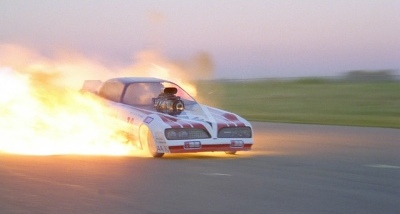 |
| [click on the thumbnail to enlarge] |
Lonnie "Lucky Man" Johnson (William Smith) is one of the biggest stars on the racing circuit even if he never really scores a win. After all, championships cost money, and winning's not in the budget. Johnson's just another marketing tool, and FastCo is only in it to shill cans of motor oil. Still, FastCo's made a lot of money off Johnson and his team, and leaning back in his posh trailer, he doesn't have all that much to gripe about either. Even if FastCo only wants him to do well enough to be competitive, Johnson's still in it to win it, but a miscalculation souping up his ride makes for a pretty nasty explosion on the track. It'll take weeks to get a new car lined up -- and that's if FastCo is willing to pick up the tab in the first place. Still, FastCo wants their meal ticket to keep making the rounds and plug those red, white, and blue cans, so marketing muckity-muck Phil Adamson (John Saxon) tells Johnson that he'll be tooling around in the team's funny car.
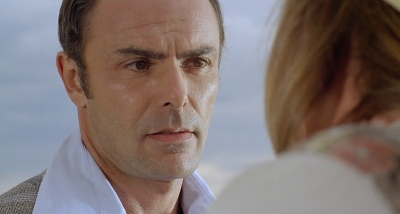 |
| [click on the thumbnail to enlarge] |
Cronenberg wasn't trying to hammer out any sort of profound artistic statement with Fast Company. It careens head-on into a pretty familiar drive-in formula, and hell, it even has B-movie heroes John Saxon (Black Christmas; Enter the Dragon) and Claudia Jennings (Unholy Rollers; 'Gator Bait) on the bill. Aside from some really eyecatching P.O.V. shots from the cars and tight closeups inside, even the directing seems pretty routine. That's okay, though; it's not as if Fast Company is trying to be Videodrome or anything in the first place. We're talkin' breakneck races, a couple of foxy hitchhikers who wind up with motor oil seductively slathered all over their boobs, another cacklingly villainous turn by the legendary John Saxon, and an awesomely over-the-top finalé. Does it revolutionize the art of filmmaking? Is it even anything particularly memorable? Nah, but Fast Company is exactly the flick that Cronenberg set out to make, and for what it is, it's pretty damned good. Recommended.
Video
I've been consistently impressed with Blue Underground's slate of high definition releases, and it really doesn't come as any surprise that Fast Company looks outstanding on Blu-ray as well. A few scattered soft shots aside, Fast Company is remarkably crisp and detailed, sporting a strong sense of clarity throughout. The sheen of film grain doesn't show any signs of being digitally smeared away, and that gritty texture is rarely thick enough to dominate the image. Its palette packs a wallop too, bolstered by deep, inky black levels. Despite being a lost movie, whatever elements Blue Underground unearthed look to have been absolutely pristine; there's no sign of wear or speckling worth griping about anywhere in here. There is a fair amount of ringing around edges, though, and that's not something I've spotted on any of Blue Underground's other high-def releases to date. Still, Fast Company looks much better than I ever would've thought, and it's one of the more impressive releases of a movie of this era from any studio.
Fast Company is lightly letterboxed to preserve its original aspect ratio of 1.85:1, and the hour and a half movie has been encoded at a healthy enough bitrate for it to spill over into the second layer of this BD-50. AVC is the codec of choice this time around.
Audio
Fast Company piles on a pair of 7.1 lossless soundtracks: one in DTS-HD Master Audio and another in Dolby TrueHD. Toggling back and forth between the two, I couldn't spot any difference, not that there's any reason whatsoever to expect that there would be. It's a decent multichannel remix; the subwoofer belts out the throaty growl of all that horsepower, the rock music written expressly for the movie is tight and punchy, and the surround channels are brimming with atmosphere. Admittedly, Fast Company isn't as aggressive as I would've expected on the racetrack. There are some smooth pans up front, but the action's only lightly reinforced in the rears. I'd opt for that subdued approach to a remix over something that's forced and gimmicky, though. It's a pretty full-bodied mix, and even the dialogue is rendered more cleanly and clearly than I'm used to hearing in movies of this same vintage. I do wish the surrounds were used to better effect when the pedals are mashed down, but this is a solid remix and otherwise better than I would've expected.
A Dolby Digital 5.1 EX track has also been included. Purists may be disappointed to hear that Fast Company's original monaural soundtrack has been shrugged off on Blu-ray even though it was served up on the last go-around on DVD. Subtitles are offered in English (SDH), French, and Spanish.
Extras
This Blu-ray disc carries
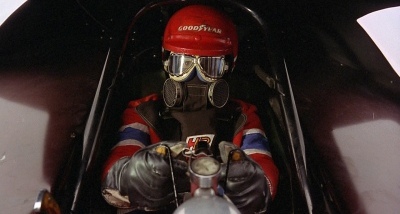 |
| [click on the thumbnail to enlarge] |
Along with Fast Company, two of Cronenberg's earliest films -- Stereo (1969) and Crimes of the Future (1970) -- have also been included. Disappointingly, though, neither is presented in high definition. Both hour-long films pose as documentaries set in futuristic research institutes, eschewing a score and, for the most part, even dialogue and diagetic sounds. The black-and-white Stereo explores a series of experiments into forced telepathy, skewing towards an odd psychosexual bent and leaning on rambling jargon. Crimes of the Future, shot in full color, changes the backdrop to the 'House of Skin' in a world where women as a gender have been all but eradicated by cosmetics. Some of the men left behind undergo bizarre transformations: one is shown growing mysterious organs while those infected with Rouge's Malady excrete an edible foam that can be milked from them (!!). Others try their damndest to find a cure or simply go mad, and Crimes of the Future's pervasive homoeroticism eases into something dark and disturbing as it draws to a close. Both films are intriguing but inaccessible experiments: artful, unabashedly avant garde, anchored around many of the themes Cronenberg would go on to explore in the decades to come, and too long by half. The anamorphic widescreen presentations are reasonably solid, even though high definition obviously would've been preferred. There are no extras related to either of these films, though.
Stereo and Crimes of the Future may not have been lavished with audio commentary by David Cronenberg, but Fast Company does feature a discussion with its director and co-writer. Cronenberg's commentaries are always engaging, and this one touches on where Fast Company falls in his body of work, the luxuries afforded him by filming with something resembling a budget for the first time, shooting inside and alongside machines with such massive, earth-rattling ferocity under the hood, mulling over having the character eventually played by John Saxon being a woman, why Fast Company dropped off the face of the earth, the many longtime collaborators he first met during the shoot, and the curious state of financing a film in Canada in this era. The highlight for me, though, is hearing Cronenberg transition from a conversation about wet T-shirt contests to his unrestrained joy at discovering that the topless afterglow of a threeway has been reinstated into this cut of the film. Though Cronenberg
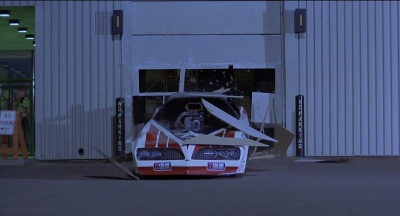 |
| [click on the thumbnail to enlarge] |
Two interviews have also been included. The first of them, "Inside the Character Actors' Studio" (11 min.; SD), is a conversation between stars William Smith and John Saxon. As its title spells out, their chat swirls around the appeal of working as a character actor, not saddled quite so much with the baggage and obligations that go along with playing the lead. Along with noting their preferences for tackling badnik roles and snickering at Smith's 14 page chunk of Russian dialogue in Red Dawn, the two of them also speak briefly about Fast Company in particular and their admiration of Cronenberg's artistry.
"Shooting Cronenberg" (14 min.; SD) interviews Mark Irwin, the director's longtime D.P.. This featurette also casts a reasonably wide net, noting the appeal Cronenberg held to directors of photography even in the earliest days of his career and later discusses such later collaborations as The Brood, Scanners, Videodrome, The Dead Zone, and The Fly. Irwin lobs out a couple of quick, colorful stories for each of those films, such as gymnastic broodlets being pitted against a drunken Oliver Reed and producers fretting about Scanners' splatter being slapped with an X rating. Fast Company naturally does capture most of Irwin's attention this time around, though, including how he landed the gig, discussing Cronenberg's longstanding love of racing even if it was in a different arena altogether, and the challenges of filming cars that could so frequently fly out of control.
Rounding out the extras is a minute-long theatrical trailer.
The Final Word
All but lost for decades, Fast Company is the most routine and forgettable of David Cronenberg's films. Still, it's a solid drive-in flick -- exactly the movie he set out to make -- and with this set also piling on two of the director's other early works, this Blu-ray disc is essential viewing for Cronenberg completists. I wouldn't expect Fast Company to hold all that much appeal to the world at large, though, but that's not really the point. Recommended.
Related Reviews
DVD Talk also has reviews of several of Cronenberg's other films on Blu-ray, including The Fly, A History of Violence, and Eastern Promises.
|
| Popular Reviews |
| Sponsored Links |
|
|
| Sponsored Links |
|
|
| Release List | Reviews | Shop | Newsletter | Forum | DVD Giveaways | Blu-Ray | Advertise |
|
Copyright 2024 DVDTalk.com All Rights Reserved. Legal Info, Privacy Policy, Terms of Use,
Manage Preferences,
Your Privacy Choices | |||||||









